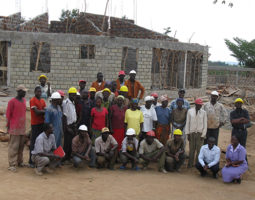Alumni Spotlight
From the Ground Up
An alumnus reflects on his volunteer work in helping build a Kenyan hospital.
 Fourteen years ago, Ukwala was a small, dusty town in western Kenya. Today, it has been transformed by the Matibabu Foundation Hospital, located at its center. Businesses have sprung up nearby to serve the people who visit, providing food, lodging and other services to families and volunteers.
Fourteen years ago, Ukwala was a small, dusty town in western Kenya. Today, it has been transformed by the Matibabu Foundation Hospital, located at its center. Businesses have sprung up nearby to serve the people who visit, providing food, lodging and other services to families and volunteers.
“Like any big medical center, there’s a lot of activity, so it’s been important for the community — not just for medical care, but the economic impact as well,” says Peter Sherris, M.D. ’74. He would know; he’s been there many times to help it grow.
For Sherris, a career in medicine was almost a foregone conclusion. His grandfather was a general practitioner. His father, John, a UW School of Medicine professor emeritus in basic sciences, and his mother, Elizabeth, a nurse, were instrumental in founding the Friends of the UW School of Medicine, a group that welcomes medical students and funds scholarships, service and elective programming.
“There was no question that I would go to UW Medicine,” Sherris says.
If medicine was a forgone conclusion, his specialty was not. Soon, however, the choice became clear. When Sherris took a job at a small hospital in northern California, he and his fellow internists each had to choose a specialty to cover. Sherris picked the intensive care unit and cardiology — and discovered an interest that would sustain him throughout his 34-year career.
Along the way, he also learned a lot about how hospitals work.
“I’m a very systems-oriented person,” Sherris says. “I loved practicing medicine, but I also loved making systems better and more effective.” So when his colleague Gail Wagner, M.D., launched the Tiba Foundation in 2004 to provide medical aid to Kenya, Sherris sensed an opportunity to help make a long-term difference.
At first, U.S. medical volunteers made annual visits and held free clinics, but the help they could offer was only temporary. “You put up a tent, there are 1,500 people waiting for you, and then you’re gone in two weeks,” Sherris says. “We weren’t really making any sustainable impact. So, with our local partners, we decided to create a community-based healthcare system.”
In Ukwala, the group rented a house to serve as a clinic and hired local staff to fill it, teaching them how to run a hospital. When they outgrew the house, shipping containers were added that served as offices. When the town offered a low-cost lease for land, the group built a 25-bed hospital. Fourteen years in, they’ve outgrown that, too, and are now constructing a 50-bed extension.
“Matibabu Hospital will soon be fully self-supporting; they’re already raising over 80 percent of their operating budget,” says Sherris. “That allows the Tiba Foundation to focus on helping them develop new services like operating theaters, X-ray suites and ultrasound equipment.”
Collaborating with Kenyan partners, Sherris says, provided valuable insights into local culture and helped develop the trusting relationships necessary to achieve their goals. “Getting direct input is very important,” he says. “You can’t just take your Western ideas and transport them over. You have to be absolutely certain that you’re doing what local people need and want.”
While it takes time to build relationships and work with local partners, Sherris sees the rewards all around them in Ukwala as the town and the hospital continue to grow.
“It’s been a wonderful experience to work with such incredibly motivated and visionary people,” he says. “They’re an amazing group doing amazing medical care.”

